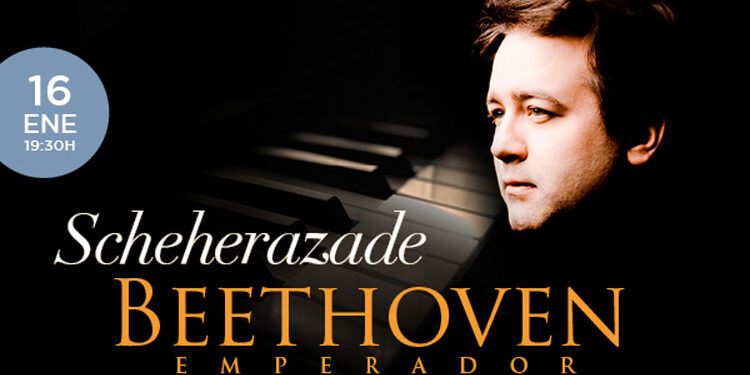The Symphony Hall of the Auditorio Nacional of Música in Madrid will be the stage for the concert organized by the Fundación Excelentia on Thursday, January 16 at 7.30 pm. Tickets can be purchased at this link.
The Santa Cecilia Classical Orchestra with conductor Christopher Allen, accompanied by Alexei Volodin (pictured), will be in charge of interpreting the Overture to Otto Nicolai’s The Merry Wives of Windsor; the Piano and Orchestra Concerto No. 5 «Emperor» by Beethoven and Sherezade by Rimski-Korsakov.
Scheherazade is a prominent female figure in the Middle Eastern folk tale collection known as The Arabian Nights. Although the piece was written by Rimsky-Korsakov in 1888, the story of Scheherazade arose during the Islamic Golden Age, dating from the 8th to the 14th century. The story is this: a monarch discovers his wife is unfaithful to him and decides to marry a new woman each day and kill her at dawn the next day so that she would not have the chance of being unfaithful. He had killed 1001 women before meeting Scheherazade, who offered to be his wife. As he said goodbye to his sister, he began to tell a captivating story, but stopped in the middle of the night when it passed all night and the sun came up. When the monarch asked her to finish, she pointed out that he had to kill her then, as it was dawn. He saved her life so she could finish the story, but once it was finished, an even more exciting new story began. So for 1001 days, he kept telling more stories and the monarch kept saving his life until he ran out of stories. During these 1001 nights, the monarch fell in love with her and made her his queen.
The piece of Russian music is divided into 4 movements: Prince Kalandar, Young Prince and Young Princess, and the Festival in Baghdad. Each movement is likely to represent a story that Scheherazade tells the monarch.
For his part, at the Viennese premiere of the Emperor Concerto in February 1812, the soloist was Carl Czerny, an outstanding pupil of Beethoven. At that concert, a French army officer allegedly called the work “an emperor among the concerts”. The nickname “Emperor” was most likely invented by one of the first editors. Whatever its origin, the nickname seems appropriate for such a great music.






